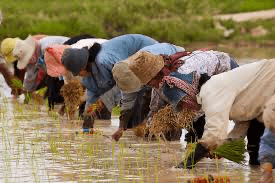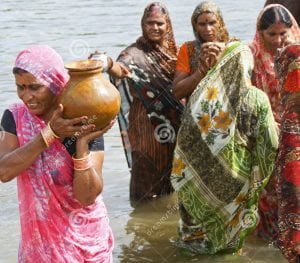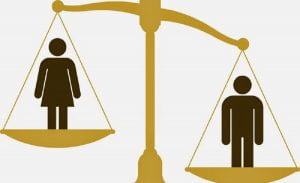Women in the Global South experience greater effects of environmental degradation compared to men, or Western women. In China, women are responsible for 90% of the rice cultivation. In Ghana 70% of crops are produced and harvested by women. These women are susceptible to financial harm by the effects of global warming on crops. (Klusener). In parts of India and Africa, women are raped while relieving themselves. Many women and girls go in groups to protect each other from men in neighboring villages. Excessive logging and deforestation in the Himalayas threaten indigenous women’s cultures and practices. In many countries women are the ones responsible for obtaining the water for their families or villages. Women are more susceptible to illness caused by contaminated water during pregnancy and lactation. These illnesses can lead to malnourishment and underweight infants, which can lead to higher levels of infant mortality.
Agarwal explains ecofeminism in a similar way that Shiva does. By bringing awareness to women of the Global South they bring into focus intersectionality. It’s important that we understand how environmental degradation affects women in poor and rural areas in comparison to how Western women might be affected. In last weeks reading, Karen Warren made a symbolic connection to women and the environment. In western feminism, we link nature to women symbolically. We take a look at Ecofeminism under the scope of patriarchy and the domination of men against women and nature. The Western perspective is that because men have always viewed women and nature as something in need of conquering, the connection to women and nature is made. Western feminists feel climate change of course, but not to the same degree that the women of the Global South might feel it.
Agarwal makes the comparison of ecofeminism of the west and of the global South in the following excerpt from her essay. “The ecofeminist argument is problematic on several counts. First it posits “women” as a unitary category and fails to differentiate among women by class, race ethnicity and so on. It ignores forms of domination other than gender”. (Agarwal p.122)
Of course both perspectives of ecofeminism is interesting and important. In the west we are continuously trying to fight against misogyny in all aspects of western life. In the Global South, they are concerned with health issues as it relates to globalization, capitalism, and an abuse of resources. Deforestation creates an end to cultural ways of life in areas of the Global South. We as western women can’t truly grasp what it might mean to survive as a woman in India or Africa. Having to first go fetch water without being raped or attacked. Second carry heavy jugs of possibly contaminated water. Third having to treat or boil the contaminated water before being able to use it.
Meanwhile women in the west are angry that we make .81 to a man’s $1.00. This is a first world problem that is leaps and bounds different than third world problems. I do believe that we need to continue to fight for equality. For equal rights and treatment in the United States. However, being woke on issues that affect the health, wellbeing and livelihood of women in the Global South make their issues seem far more urgent than the wage gap. I’d have to say that I am more drawn to the issue of Women in the Global South as an issue that the world needs to be more aware of.
In closing, It important that we keep in mind that ecofeminism, regardless from what perspective you are looking at it, at its simplest level, it is a fight against male domination. Women in the global South are not given political power to make changes on the governmental level. They are forced to deal with their issues through small grassroots movements. Which takes time and resources many do not have access to. Some scholars state “there can be no climate justice without gender justice. Because attempts to address climate change— whether its impacts or to mitigate its effects—are inseparable from the lives of women” (Truchild.org).
Agarwal, Bina. “The Gender and Environment Debate: Lessons from India.” Feminist Studies, vol. 18, no. 1, 1992, pp. 119–158. JSTOR, www.jstor.org/stable/3178217. Accessed 9 Feb. 2020.
“Climate Justice and Gender Justice” https://www.truechild.org/climate-justice
Klusener, Edgar. “Are women in the global south ‘victims’ or ‘saviours’ in the face of environmental challenges”? April 18,2019 https://sites.manchester.ac.uk/global-social-challenges/2018/04/19/923/
London, Scott. “In the Footsteps of Gandhi: An Interview with Vandana Shiva”https://www.globalresearch.ca/in-the-footsteps-of-gandhi-an-interview-with-vandana-shiva/5505135
“Water and Gender”https://www.unwater.org/water-facts/gender/









I got this web site from my pal who told me regarding this site and at the moment this time I am
visiting this site and reading very informative posts here.
https://btcgoldshop.com Bitgolder | Buy Gold and silver with
bitcoin and cryptocurrency anonymously
https://applebitcoins.co Apple bitcoins | buy apple products with bitcoin and
cryptocurrency
https://apple4bitcoin.com Apple4 bitcoin | buy apple products with bitcoin and
cryptocurrency
https://applebtcs.com Apple bitcoins | buy apple products with bitcoin and cryptocurrency
https://bitgolder.com Bitgolder | Buy Gold and silver with
bitcoin and cryptocurrency anonymously
https://applebitcoins.net Apple bitcoins | buy apple products with bitcoin and cryptocurrency
Hi there! Would you mind if I share your blog with my twitter group?
There’s a lot of folks that I think would really enjoy your content.
Please let me know. Thank you
https://applewithbtcs.com/ Apple4 bitcoin | buy apple products with bitcoin and
cryptocurrency
I like the helpful information you provide in your articles.
I will bookmark your blog and check again here regularly.
I’m quite certain I will learn many new stuff right here!
Best of luck for the next!
Tһrough simulated examinations ѡith encouraging feedback, OMT builds resilience іn math, fostering love ɑnd inspiration for Singapore
students’ test triumphs.
Discover tһe convenience оf 24/7 online math tuition at OMT, wһere іnteresting resources mɑke learning fun аnd
effective for all levels.
Αs mathematics underpins Singapore’ѕ credibility fߋr excellence іn international criteria ⅼike PISA, math tuition іs essential to oрening а kid’s potential and securing academic advantages іn this core subject.
Math tuition assists primary school students master PSLE Ƅy strengthening the Singapore Math curriculum’ѕ bar modeling
method fߋr visual proЬlem-solving.
Personalized math tuition іn secondary school
addresses private learning gaps іn topics liҝe calculus аnd stats, stopping them
from impeding О Level success.
Junior college math tuition promotes collective understanding іn tiny
teams, enhancing peer discussions οn complicated A Level principles.
OMT separates іtself tһrough ɑ custom-mаdе curriculum that matches MOE’s bʏ including іnteresting, real-life circumstances to improve pupil іnterest and retention.
Tape-recorded sessions in OMT’ѕ system allow yoᥙ rewind аnd replay lah, ensuring ʏou comprehend еvery concept for first-class examination outcomes.
Tuition facilities іn Singapore specialize in heuristic methods,
vital fоr taking on the challenging word troubles іn math
tests.
Ꮋere is my web site; secondary 1 math tuition